#i think i may have found a way to make the audience uncomfortable and complicit without alieenating them completely. hopefully
Explore tagged Tumblr posts
Text
writing my direct address monologues with a gentle, delicate, fingerless glove-clad hand
0 notes
Text
Inspirational Artist Links: Performance Art
electric stimulus to face by Daito Manabe: This was an Interesting and intimate piece. I think that the music and the synchronization were both very important elements to this performance. The music helps us find rhythm in the piece, and the synchronization helps define visual continuity. I struggle to find a deeper meaning or message, but it defiantly made me feel…. Comfortably uncomfortable.
Alter Bahnhof by Janet Cardiff-This piece was very surreal, It resonated with me a lot. I found myself constantly searching for the woman speaking, until she pointed herself out. I enjoyed the feeling of being both removed and entangled from the performance.
Bike Lanes by Casey Neistat (activism)- I really really enjoyed this piece! I like how the message is short, concise, and clear. It really is just a “Middle fingers up” composition and I really liked how he crashes into a cop car at the end, it brings the performance together.
Legend + Queen by Candice Breitz (cultural studies)- This is AMAZING. There is something that is so raw and human about this performance, and its captivating. There is nothing more joyful than Bob Marley, and to have it sung this way is so blissful and intimate. LOVE!
Meat Joy by Carolee Schneemann (iconic performance art piece)- this piece was… sexual, but in a mass consumerism, women are piles of meat to be consumed by men kind of way. I recognize that all the women are smiling and laughing, being complicit in the performance, but I can’t help but feel that there is a rape-y undertone to the whole thing.
Vanessa Beecroft Interview + VB40 by Vanessa Beecroft (suffering + beauty)- I like how this piece is about the interview of the artist, and not the nude performance. It is a criticism on how Beecroft must exhibit control, even over the audience that comes to view her work.
The Astonished by Bill Viola- Every time I see this piece I get…. Annoyed. I don’t know what about their performance is so irritating to me but it is, it might be the speed. I suppose that any performance that gets such a strong emotional reaction form the viewer is an effective work, even if it may not be what the artist intended.
Staging by Maria Hassabi- I understand the point that the artis is trying to make here, and I think she explains it well. I am unsure if I would have seen the bigger message of her work if I had seen the performances live. Her interview is an important element to the piece, which I think is a dangerous place to be.
Talking Tongues by Lisa Steele (1982)- this is a simple composition that is clear and effective. The art lies in the message, which is refreshing. Sometimes artist get lost in the “canI?” not the “Should I?” This piece respects the message, which I appreciate.
Perimeter of Square by Bruce Nauman (iconic performance art piece)-This piece did not resonate with me, I fail to see a larger point or message about the “why.” Anyone can move rhythmically, is this a criticism on what it means to dance? Perhaps. Punk Prayer by Pussy Riot – I really enjoyed the juxtaposition of the punk music and the more traditional worship sounding music. I think that this piece lacks some context for an American viewer, and would be more effective to a native viewer. This seems to be a brave live performance, which adds to the “punk aesthetic. ”
Cut Piece by Yoko Ono(iconic performance art piece)- I like this piece a lot because, like the dictation says, it addresses what we consider to be inappropriate and appropriate behavior. I like pieces that challenge social mores, and this piece really encourages people to think about why we behave certain ways, and how that can change in a group.
Interior Scroll by Carolee Schneemann (iconic performance art piece)- I love pieces that address the feminine, and what better way to do that than with an actual vagina! I think this piece is profound and surreal, but ultimately effective.
Bound Mouth + Foot by Kate Wingard- Ew, ew, ew. I hate this piece in the best way possible. What does it mean? Im not sure, but I do not like it. The heavy breathing and pudding ASMR makes it weirdly sexual, while still maintaining a disgusting factor.
Wholesome by Megan Carnrite- this piece makes me profoundly uncomfortable. I enjoy the piece’s composition, but it is incredibly intimate and familiar, while being gross and repulsive.
Roll of a Woman by Javid Rezvani- this is a brilliantly composed performance. The actress does a brilliant job of being both flirtatious and coy with the audience. I really enjoyed how they never directly address what they are talking about and lead you to believe she’s talking about sex.
How to Earn a Glass of Water by Dallas Scott- really brilliant and highly dedicated. This piece plays a lot with time and patience. Its intriguing and thought provoking while maintaining simplicity and grace.
Can Knot by Alexandra Gutierrez- this is an interesting piece as well! I like how she is patient in the beginning, and works her way through the cord. I also like this piece because it is familiar to all of us, its something we all have to do.
2 notes
·
View notes
Text
Carisi-centric thoughts on Eps 18x20, 18x21
I'm glad that's over.
Overall Thoughts
This was an intense but unnecessarily convoluted episode. This case could have been solved in fifteen minutes, not two hours. At least it wasn't another "rich white people he said/she said," and all the characters got their moment to shine, but I can't say I enjoyed it. It wasn't bad, it just kind of dragged. There was no need to stretch this over two episodes. The squad had to track down about twelve different witnesses to the same crime. Eliminate a couple of those witnesses, a few of the racist rants, and a Hallmark moment or three, and you'd have one tight finale.
Benson's Dilemma
I have to start here.
The characters kept saying it, but I don't see what was so different about this particular case (other than the fact it was not about rich white people). Hate crimes happen every day. So do rapes and murders. Why would Barba suddenly decide to urge Liv to lie on the stand? That wasn't just random and out of character, it wasn't supported by the script.
If they needed Barba to do that to create tension between himself and Liv, if they wanted to make Liv look better by comparison, and more ethical than Barba, they needed to set it up better. I mean, it didn't even make sense. When Barba was trying to convince Liv, he effectively said "I'm not saying lie, I'm saying maybe the witness was confused," but what does that have to do with anything? Liv could only testify to what she personally heard. If the witness says, "I told Benson," Liv can't say, "oh, I don't know, maybe she's confused". Liv can only say "yes, she told me," or "no, she didn't tell me." Liv can only tell the truth, and she's certainly not confused, so what was Barba's point?
Also, we're supposed to believe Barba would jeopardize his own career (which is already in the shitter, so maybe I'd buy that, actually), but also Liv's career, and for what? So he wouldn't lose? For justice? If so, why this case, and not last week's case? Why not next week's case? (thank God there's no next week) Why not every case? Is this something he's done before? Is this something he'll do again, if he thinks he can't win? What are his standards for lying? (probably “is it the season finale?” lol) Does he even have any standards? Where's the line? Is Barba okay with perjury now? And from now on? Or was it a one-time thing?
Dodds Thoughts
I wish the writers had chosen Dodds Sr. as the only character to gently goad Liv into lying. That would have been enough. I don't see why Barba had to compromise his own ethics. As a matter of fact, I loved the Dodds Sr./Olivia scene. It's worth noting that Dodds Sr. didn't actually try to sway her directly, not like Barba did. Dodds Sr. just offered her some perspective, and shared his own experiences. I loved that he said he had played it both ways, in the past. That was believable, for a cop in his position. It was subtle, and beautifully played, and well-written.
Bottom line, Dodds Sr. still let Liv make up her own mind. Barba tried to be cute, all "lol she was confused, Liv, can't you say you were confused too? Pretty please?" which kinda rubbed me the wrong way. And Liv clearly felt the same. Compare her reaction to Barba ("are you kidding me, sis?" and then a hilarious rejection) to her reaction to Dodds Sr. (she legitimately asked for his advice, in the end, with that quote about Mike lol whos' mike?, and she genuinely smiled at him).
I don't know. The whole thing reeked of "omg you guys it's the season finale and we need some drama". I'm glad Liv decided not to lie.
But let’s get to Sonny:
Sonny's Temper
Finally, the writers found a way to make Sonny angry in a believable way. In a way that wasn’t out of character. In a way that made sense in context, and didn’t come out of nowhere. Seriously, out of all the instances in which Sonny has lost his temper this season, this is the one and only time I felt for him, and thought he was justified. I mean, was it necessary to have him body slamming people left and right, throughout the episode? No. Was it necessary to have him (and everybody else) yelling in every other scene? No. But was it too much, or too violent? Also no.
This wasn't random anger for no reason, this wasn't just, "OK guys let's all SHOUT all our LINES because it's the season FINALE!!!!" (though that totally happened, too. They even got the usually very whispery Kirk Acevedo to yell, which made me laugh).
Sonny had a real reason to be mad, and that made a difference. Roughing up a perp is one thing, and it still makes me uncomfortable because I'm a SJW oops, sorry, I thought I was an SVU writer for a second, and I started using buzzwords :D
But shoving ICE agents, because they're detaining a key witness, and they're practically sending him to his death? Making Sonny break his promise, in the process? And letting rapists and murderers go free? That’s anger I can get behind.
I also appreciated the way Sonny and Barba argued without either of them losing their temper. They disagreed (and they didn't even really disagree, because Barba was only suggesting to use the threat of deportation as a bluff sort of), but they just expressed their opinions as professionals, and as equals, without any yelling or finger-wagging. And they both (sort of) had a point. That's the type of argument we might have seen in a previous season, and I enjoyed it watching it play out.
Sonny and Empathy
Finally, we got to see Sonny's love for children, shining through. That was always one of Sonny's main characteristics, and we never got to see it this season (aside from Great Expectations, a rare highlight). The way Peter conveyed Sonny's dismay at busting in on a couple of little girls with a gun in his hand? It was only a two-second reaction, but it said it all. Same for the way he tried to be there for Hector's poor daughters, kneeling in front of them at the hospital, trying to keep them away from their rightfully furious mother.
It was also interesting how Sonny was the only character who had strong feelings about threatening a woman using her children as leverage. Amanda and Liv, both mothers, had no such qualms (Rollins threatened multiple people's kids, like five times, and Liv was fine with literally calling ICE). Barba also had no qualms, but then Barba isn't exactly the most emotional person, lol.
I have to say, I didn't enjoy those threats. Every time, I'd side with the mother (even the racist one, who otherwise made me shudder). Leave kids out of this (didn’t Liv and Amanda go through this themselves, in Real Fake News?). And don't use shitty and scary immigration laws to threaten innocent people. It should be said, Soledad's husband was certainly complicit, but Soledad herself was just lying to keep her family together. Yes, murderers would go free as a result, but her motives weren't evil. Did she deserve to be separated from her kids?
And, the real question here, the one Liv and Barba ignored: did Soledad’s kids deserve to be separated from their mother?
That was my main issue (and also the main reason I loved Sonny’s reaction). I did agree with Barba in having little sympathy for Soledad, because ultimately she was lying, but what about her children? Barba had no sympathy for them, either. Sonny did (and Fin and Amanda seemed to agree). Sonny even sweetly said, "it's late, her kids are asleep," which was a wonderful detail. Liv and Barba were like, "Round 'em up! Right now! Traumatize those kids for life! Coercion! Fuck yeah!" but Sonny actually stopped to consider the emotional implications for those kids. That one line, and the way he said it, it moved me. It was perfectly consistent with Sonny's personality. He cares. He sees the big picture, but he also thinks about the little things, and how they affect others. Especially children.
That’s why that was my favorite Sonny moment in the entire finale. It showcased his empathy, and his idealism, and his conviction in his beliefs. Sonny has always been unafraid to speak his mind, even if his superiors disagree.
Speaking of Sonny's superiors, I wonder if this stunt made Sonny respect Liv and Barba a little less. Because that happened to me. And Fin, who totally called Liv out :D
Morality Thoughts
I may joke about it, but I loved how Sonny and Fin clearly didn't approve of that stunt, of threatening a mother of two small children with deportation, and I appreciated the fact they were "allowed" by the writers to express those opinions to Barba and Liv, respectively. I also liked that Liv didn't answer Fin's question. That's the type of "grey area" writing which was sorely missing this season.
This was the rare instance when the audience wasn't expected to think Liv is 100% right, for a change, and the writers even had a beloved character like Fin call her out. They had an idealistic and sincere character like Carisi call out a more pragmatic and underhanded character like Barba. That was actually good writing (what???). Letting the audience draw its own conclusions. I wish the writers hadn't waited until the finale to start doing that.
Stray Thoughts
This season didn’t give us much on the Barisi front (or on any front), but it did give us this:
YOU’RE GONNA DEPORT ME TO CUBA? AND TAKE HIM TO ITALY? :DDD
Peter Gallagher is so handsome. And so talented. He brings so much to all his scenes. How does he do it? And why can't the rest of the SVU cast do it too, lol? No one came close to his nuanced performance, last night (from the regulars, I mean. The guest cast was mostly fantastic). And his lines weren't even that great. Honestly, how does he do it? I love him.
I also love not Eddie Kirk Acevedo. Were they trying him out as a potential new squad member, pairing him up with Sonny, and having him participate in an interrogation with Amanda, or is that wishful thinking? And does it even matter, now that we'll get a new showrunner? I mean, they probably needed guest stars to fill the airtime, because the finale was 2 hours long and the show only has like 3 characters left :D
Fin still has a detective's badge, right? Did I blink and miss him actually making Sergeant? And did I also miss a reference to his twitter-grandson?
Rollins, after shoving and practically headbutting that woman in front of her small son: "Honey it's okay, your mommy's fine! I'm just about to punch her in the face, but it's all good! Go play with your Xbox!"
I liked Yusef's reactions to Sonny's naive remarks about America. "I get it." "No you don't." Damn straight.
Did Sonny kick down that door literally ON that woman's face? The hell? She was standing right behind the door as he kicked it! Sonny, sweetie, you're no Derek Morgan. Leave the door-kicking to the experts.
Barba keeps getting swerved by Liv, lmao.
I won't get into the politics of it all. I don't have the time or the inclination. I'll just say the script was way too heavy-handed. I mean:
random guy, for no reason whatsoever: "What is happening in this country? This is America, right?"
Sonny (and me): "...yeah okay thank you we'll call you if we need anything else bye"
I am GLAD that's over.
#sonny carisi#rafael barba#olivia benson#fin tutuola#svu#law and order svu#episode thoughts#long post#also#amanda rollins'#is amanda an afterthought for the writer lately#or is it me#anyway#season eighteen is DONE#and not a moment too soon#onwards and upwards#phew#ok now i can finish that episode tag#and then#the halloween fic lmao#and THEN THE WEDDING FIC#no promises on when#but it'll happen#i love you all
29 notes
·
View notes
Text
Let’s talk about: Arrow 5.19
In which I’m forced to defend Felicity.
After a month’s hiatus, Arrow has returned. Adrian Chase has been exposed as Prometheus, but he’s escaped, and the entire episode revolves around Felicity’s acts of desperation conflicting with the higher moral ground that Oliver has decided to occupy this week.
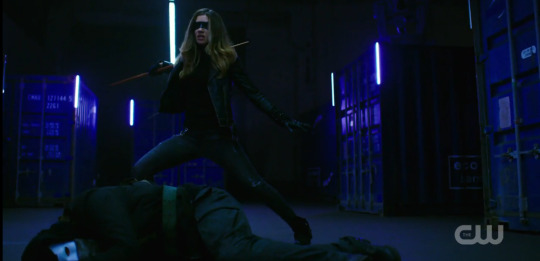
First off, shout out to Dinah Drake, who didn’t have a whole lot to do but worked what she got.
So anyway, as I mentioned, the dramatic tension of this episode revolves around Oliver v. Felicity (or Oliver and Diggle v. Felicity) with a little bit of Diggle v. Lyla thrown in there at the end. I should say that my feelings about Felicity throughout the course of the series has been conflicted at best. When she was basically a vehicle for “witty” one-liners and double entendres, I mostly rolled my eyes and ignored her. When she was elevated to romantic lead and Supreme Goddess, I hated her. And yet for most of season 5 I’ve ping-ponged back and forth between ambivalence to maybe, sorta, almost liking her in spite of myself?
And yet throughout the series, regardless of my feelings for the character, I have loathed the paternalism levied on her, levied on every prominent female character, in fact, with perhaps the exception of Sara (I would have to go rewatch S2 to be sure). The entire conversation between Oliver and Diggle had me practically seeing red, as they bemoan Felicity’s descent into that moral gray zone that only they are supposed to enter.
The face I was making, it was kind of like this:
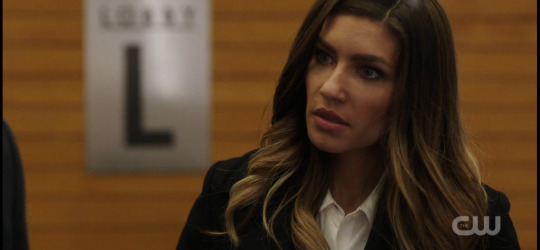
Consider this line of dialogue:
“We knew she was involved, and we let her get in deeper.”
The entire conversation is framed in this way, as their failure to exercise control over Felicity’s actions. To be clear: it’s perfectly fine to express concern when you think someone is making poor choices, but they did that. Both Diggle and Oliver on separate occasions expressed their concerns to Felicity, and she took note of those concerns and decided to continue on the path she was going down, because she’s a grown ass woman who can make her own mistakes. It doesn’t mean she’s justified in what she does, she can be wrong! But at the end of the day she is the one responsible for her actions.
To make matters worse, it’s clear this conversation between Oliver and Diggle is not about Diggle taking Oliver to task for failing to exercise control over a team member as the leader of Team Arrow, but for failing to exercise control over her as her ex-fiance!
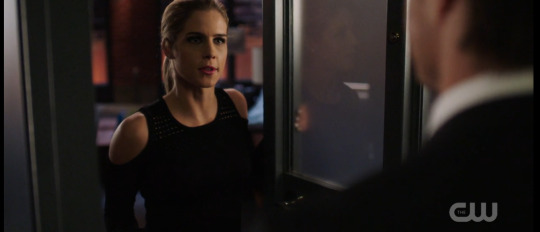
Felicity did look pretty amazing in her heist gear, I must say. It was completely inappropriate for the occasion, and I’m not sure why you need 3″ wedge heel boots and smoky eyeshadow for a caper, but whatever, she was wearing something other than those glasses and those ugly designer dresses and she looked amazing! That works for you, Felicity. You should go on capers more often.
But back to my rant: Sometimes Felicity’s bad choices are just Felicity’s bad choices, and she should be allowed to make them and live with the consequences of making them without being immediately absolved. But the show writers have consistently shown a wariness or inability to give Felicity any kind of moral complexity. She is routinely deified as “the best of us,” “the strongest of us,” “our moral voice,” and her questionable choices are always narratively justified or nullified. Her complicity in Susan’s firing earlier in S5 was waved away with a weak “I didn’t know what Thea was going to do!” (she asked you to plant leading evidence on Susan’s computer and you didn’t know what she was going to do with it? I thought Felicity was supposed to be some sort of genius!) It makes for a character who, when you get down to brass tacks, is pretty boring, who isn’t allowed anything by way of character growth. The scrapes and bumps she must heal from are always inflicted from the outside; her problems are never hers, she’s a victim of the mistakes of others.
For whatever reason, the writers can’t stop themselves from tripping over themselves to elevate her, even with awkward throwaway lines like the one from Diggle in this episode:
“Felicity Smoak is one of the best people I’ve ever known.”
It’s weird, the way other characters talk about her. I have some very close friends who I love with all my heart, but I don’t think I have or would ever appraise them in quite that way, surely not in a pseudo-argument with my spouse (especially since Diggle was basically saying “If even Supreme Goddess Felicity could go darksided, then oh god you, my wife, it could definitely happen to you.”) And this is far from the first time that other characters have talked about Felicity in a way that is entirely unique, that is not found in the way characters talk about any other character. It’s like an edict from on high; every now and then the Powers That Be must possess someone and use them as a mouthpiece to remind the audience that this is a good character and we love her, OK?
This was also true about Oliver and Felicity’s relationship when it was getting off the ground and/or in full force, by the way. Diggle’s descent into the king of Olicity shippers was just weird, but even that pales in comparison to Laurel shipping Olicity on her deathbed. Why do we need everyone to love and endorse this relationship, this character? It suggests a lingering, uncomfortable insecurity in the writer’s room, a fear that they can’t adequately convey how good and right this relationship or that character is without having it explicitly reinforced by anyone and everyone.
And let’s talk about Lyla for a second. Unpopular opinion: I hate Lyla.
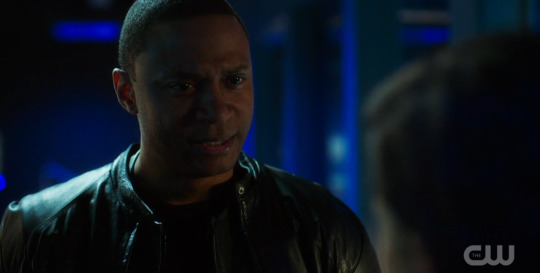
I know, Digg. But hear me out. In a meta sense I have never warmed to Lyla. She was introduced as a replacement for Diggle’s S1 love interest, who we never saw or heard from again, and she eventually became Amanda Waller’s ARGUS replacement. That’s two black women that Lyla’s stepped in the shoes of, taking their place in the narrative. I’m not trying to draw anything from two data points, I’m just saying it’s enough to give me pause.
Amanda Waller was not a good person. Her decisions as the head of ARGUS weren’t even morally questionable, they were often morally wrong, yet in spite of that, Team Arrow worked with ARGUS on a number of occasions for their own ends (and, again, going back to Felicity, I can’t blame her being frustrated for being told she can’t follow the team’s general “ends justify the means” ethos because she’s been placed on a pedestal as the team’s moral beacon). In this episode Diggle expresses dismay about Lyla becoming “like” Amanda Waller, but what? Excuse me? Wasn’t she always complicit, if not outright involved in some of Waller’s questionable leadership decisions? Lyla wasn’t some powerless lackey, she was fairly high up in ARGUS even before Waller’s death. She chose to be there, she chose to act in concert with Waller, and Team Arrow often benefited from those choices. They’re all hypocrites.
This episode maybe (for me, hopefully) has sewn the seeds of the dissolution of Diggle and Lyla’s marriage. At the very least, it’s a problem that will doubtless linger. Early in the episode when Lyla takes a piece of evidence for ARGUS, the camera lingers on Dinah’s disapproving expression. This suggests to me that there is some merit that perhaps they’re going to explore Diggle and Dinah’s relationship to some extent. How do I feel about this? I don’t know. I’m happy to have Diggle do something other than act as Oliver and Felicity’s cheerleader, I’m happy for him to finally take a stance against his wife’s dubious actions, so I’m certainly interested to see where this is going. But I fear for Dinah if she devolves into Diggle’s arm candy.
The B-plot is Quentin “Hoss” Lance ignoring Rene’s boundary-setting by taking it upon himself to summon Rene’s daughter for an impromptu, surprise meeting, which ends with Rene’s renewed commitment to getting his daughter back.
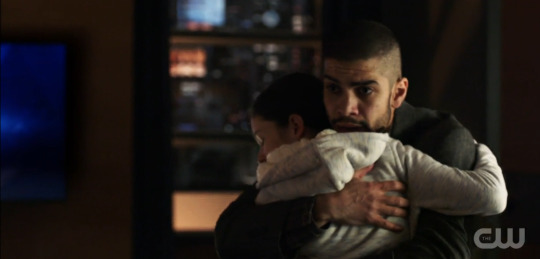
I get that this plot is supposed to be heartwarming, but Quentin bowls through Rene’s concerns due to his fresh grief over losing his daughter. To Quentin’s credit, he’s doing remarkably well for someone who’s managed to lose his two daughters THREE times, but sometimes the best thing you can do for someone is recognize that you’re not good for them, and if Rene truly feels that he isn’t good for his daughter, then it’s a good thing that she’s in a more stable environment. Let’s not forget this is a guy who runs around in a hockey mask and carries a gun; he may not be passing out drunk, but I still have some serious concerns about his ability to provide a stable environment. And for Quentin, it’s not even about Rene--not really. It’s about Quentin vicariously living through Rene, because he misses Laurel.
And finally, there were at least three references to Curtis’s “lawyer friend.” This is a strange turn of phrase to be repeated multiple times throughout the episode. Not “Curtis’s friend, who’s a lawyer,” not “a lawyer I’ve been put in touch with, thanks to Curtis,” but Curtis’s Lawyer Friend. Curtis’s Lawyer Friend. Curtis’s Lawyer Friend. Is this alluding to something (someone)? Or is is just strange dialogue? The writing on Arrow is so uneven that it’s difficult to distinguish when they’re attempting to signal something and when they’re just writing sloppy dialogue. Is “Curtis’s Lawyer Friend” supposed to ping something? I honestly can’t recall if we’ve got any relevant lawyer characters waiting in the wings; personally, I’d love for “Curtis’s Lawyer Friend” to be Damon Matthews, but again, maybe they weren’t attempting to signal a new, incoming character. Maybe Rene’s lawyer will, forevermore, simply be known as “Curtis’s Lawyer Friend.” Maybe that’s his actual name. I don’t know. ‘Til next week, which looks like a bottle episode.
1 note
·
View note